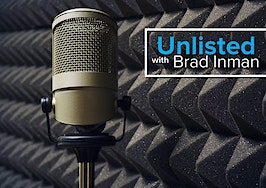Realogy CEO Richard Smith is a man of few words. At an investor call yesterday in which Realogy reported its killer 2015 earnings, he was asked by an analyst whether the company had concerns about disruption caused by technology companies potentially impacting the apartment rental brokerage market..
“Virtually none,” said the straight-laced Smith, who wears a tie and suit to work every day — and often wears an American flag on his lapel. “I think the most disruptive technology you could buy, we bought, and it is working quite well, so we are excited about the future,” he added, referring to Realogy’s acquisition of ZipRealty.
When Smith speaks, he does with authority. Just ask the executives who work with him every day. He is taken seriously because he is a serious guy with a dead-serious tone.
A former homicide detective, Smith deals in facts, not storytelling.
I listened to the Zillow earnings call earlier this month, too. Contrasted with the Realogy call, it was like a big Italian family birthday party (Zillow) versus a pair of Danish doctors sharing a quiet dinner (Realogy).
Notorious storytellers, Zillow executives opined about all sorts of things, throwing in assorted Zillowisms before digging into the financial numbers.
The two have a deep partnership that keeps Zillow agent ads off Realogy listings, and yet there is purportedly equal amounts of distrust as respect among the two powerhouses.
As the guardian of the tried-and-tested legacy real estate model, Smith’s track record is remarkable. Realogy’s revenue is eight times that of Zillow, and an estimated 25 percent of all real estate deals go through the multi-brand Realogy octopus.
Smith’s only real misfires over the last 20 years were not entirely of his own making — a sizeable Realogy tech investment in the middle 1990s got tangled up in the Homestore debacle, bruising everyone involved. And for years, Realogy reeled from a suffocating debt load of $6 billion when Apollo acquired the company in 2007. It gave Realogy founder Henry Silverman a lucrative exit, but it left the company gasping for air when the housing market and the economy cratered.
The New York Times dubbed Realogy’s recovery from that mess as the “Rocky Balboa of corporate America.” Smith was the wizard who saved the company, along with support from Apollo, who got their payday when Realogy went public for the second time in 2012.
Smith has seen hundreds of alleged disrupters challenge how Realogy (and most of the industry) does business, but they come and go like for-sale signs in a hot market. But he may not have seen the likes of some new disruptors who are smarter than their predecessors and are certainly better funded. They are taking direct aim at Smith and the old guard.
And who are these new disruptors? Names, please.
The scheme to replace agents
I hear through the Silicon Valley grapevine that two supersonic smart guys are investing in data scientists who are cooking up a scheme that may replace real estate agents.
One of them is about half of Richard’s Smith age, 33-year old Joseph Lonsdale, who on Wikipedia is described as “an American entrepreneur, investor and philanthropist.” Lonsdale is a founding partner at Formation 8 Partners Formation, a savvy Silicon Valley technology investment fund. He also co-founded Addepar, a disruptive private wealth management technology company. Earlier, he started Palantir Technologies, which analyzes, integrates and visualizes data for the defense and finance industries.
Both companies leverage data modeling, data aggregation and analytics that scramble and reset complex financial industries. You can imagine a data-driven software program that emulates the work of a real estate agent.
If true, this secretive and unnamed real estate startup has no shortage of brainpower. The former “PayPal mafia,” with superstar investors like Peter Thiel, may be in on the venture.
I wish I knew more.
OpenDoor is a less-secretive but an equally well-funded venture that is ready to blow the doors off how real estate is transacted — and, for now, acting more friend than foe to the old guard. The company is coming out with a slew of disruptive products that make showings, valuations and home offers as easy as using Apple Pay at the grocery store (almost).
One of the coolest products is for open houses at vacant homes. Imagine 24/7 open houses in which the homebuyer texts a number to obtain a code to to gain entry into the house. Consumers are eating it up, say company officials.
The good news is that the real estate stable is a big one, and we have some thoroughbreds like Richard Smith holding onto the pole position, as yearlings like Lonsdale take aim at the $60 billion real estate commission garland of roses.
This is way too much fun to watch.
Onward!









